|
|
|
Sort Order |
|
|
|
Items / Page
|
|
|
|
|
|
|
| Srl | Item |
| 1 |
ID:
097785
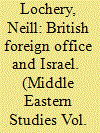

|
|
|
|
|
| Publication |
2010.
|
| Summary/Abstract |
The article examines the complex relationship between the British Foreign Office and Israel. It argues that in 1976 was a year of transformation in the relationship as the Foreign Office shifted towards a more critical approach towards Israel following the resignation of the British Prime Minister Harold Wilson. It makes use of newly available documentary sources from the National Archives in London, which illustrate how the Foreign Office used the resignation of the widely perceived pro-Israel Wilson, and the arrival in power of James Callaghan, to quietly shift British policy towards the Arab-Israeli conflict to fall more into line with the policies of Britain's European Partners.
|
|
|
|
|
|
|
|
|
|
|
|
|
|
|
|
| 2 |
ID:
097790
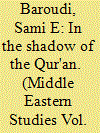

|
|
|
|
|
| Publication |
2010.
|
| Summary/Abstract |
Academics have paid far more attention to Islamist movements than to the political discourse of contemporary Islamist authors. This is regrettable for four main reasons. First, Islamists address issues of major importance to their societies and these societies' relations with the external world, especially the West. Understanding their discourse holds the key to a better understanding of Islamist movements. Second, Islamists form an integral component of the Arab intelligentsia. As opinion shapers they influence the attitudes, beliefs and value systems of Arab publics. Third, Islamists have been writing extensively and critically about the United States, especially since the end of the Cold War. It is of great importance to understand why they are so 'preoccupied' with America and why they view it the way they do. Finally, Islamists write in a distinct style that leans heavily, and in complex ways, on the sacred text (the Qur'an). It is intriguing and intellectually stimulating to analyze the substance and style of their discourse and to contextualize it historically. This article focuses on one specific and critical aspect of contemporary Islamist discourse: its treatment of the United States.
|
|
|
|
|
|
|
|
|
|
|
|
|
|
|
|
| 3 |
ID:
097788
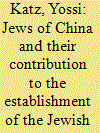

|
|
|
|
|
| Publication |
2010.
|
| Summary/Abstract |
This article deals with the contribution of Zionists throughout the world to the building of the National Home in Palestine, including the Zionist communities in the Far East - India and China. It examines the vast Zionist activity taking place in China, with the Zionists of China making a significant contribution, especially considering the small size of its Jewish community. In contrast to popular belief, in the period discussed in our research China was not distant and disconnected from the Zionist centres in Palestine and Europe. Written Zionist propaganda and Zionist representatives did not overlook China. The notable extent of donations and investments made by the Jews of China benefiting the National Home through the Jewish Colonial Trust, the Jewish National Fund, and the Foundation Fund is the result of two main factors: firstly, the economic strength of the community, especially the very wealthy Iraqi Jews, and secondly, the Zionist passion of the Chinese Jews. The Kadoorie family, whose donations assisted in purchasing land for the Hebrew University, the building of Ha'emek Hospital, and the establishment of the Galilee agricultural school, played a pivotal role. There is no doubt that Eliezer Kadoorie serving as head of the Zionist Organization in China as well as some of its institutions helped widen the circle of donors among upper and middle class Zionists in China, and shared in their prominent part in creating the Jewish National Home in Palestine.
|
|
|
|
|
|
|
|
|
|
|
|
|
|
|
|
| 4 |
ID:
097784
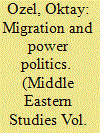

|
|
|
|
|
| Publication |
2010.
|
| Summary/Abstract |
This study is an examination of the relationship between migration and politics, focusing on the case of Georgian immigrants settled in the central Black Sea districts of Ottoman Turkey during the last quarter of the nineteenth century. Based on the extensive use of Ottoman and British archival material as well as interviews conducted in the region, the study reveals insights into the intriguing power politics behind migration in the Ottoman Empire. Scrutinizing certain characteristics of the settlement process, it also demonstrates the complex imperial network of power that linked the most distant border districts of the Batum-Curuksu (modern Kobuleti) region of Ottoman Caucasus directly to Istanbul via the Black Sea region of Ordu. The central argument of the study is that the leader of the immigrant group, namely Curuksu Ali Pasha, not only successfully managed the settlement process of his fellow Georgians but also masterfully manipulated all the stages of migration and settlement, making use of the conditions in his fierce power struggle against the appointed Ottoman governors as well as the native Muslim nobility of the region. The study thus shows how the personal agenda and the central position of a local Pasha in such a struggle for domination can dangerously destabilize life in an Ottoman province and sow the seeds of animosity between the immigrant community and the natives that eventually accelerated into warfare in the 1890s, creating a serious 'Immigrant Problem', the legacy of which lasted up to the early Republican period.
|
|
|
|
|
|
|
|
|
|
|
|
|
|
|
|
| 5 |
ID:
097789


|
|
|
|
|
| Publication |
2010.
|
| Summary/Abstract |
This study examines the development and nature of the regulation of prostitution in Beyoglu during the late Ottoman Empire with special emphasis on the way the regulationist regime reinforced existing patterns of class and gender domination. The regulation of prostitution became a matter of urgency in the last decades of the nineteenth century in Istanbul, particularly in Beyoglu, the cosmopolitan centre of the city. Through this process, the protests of the local residents of the area objecting to the proliferation of prostitution in their neighbourhoods played a crucial role in prompting the governmental authorities to tighten the regulations.
|
|
|
|
|
|
|
|
|
|
|
|
|
|
|
|
| 6 |
ID:
097787
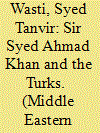

|
|
|
|
|
| Publication |
2010.
|
| Summary/Abstract |
Sir Syed Ahmad Khan was a pioneer of higher education for the Muslims of India after political power passed to the British in the nineteenth century. He was a leader who foresaw with clarity that Hindus and Muslims were bound to seek separate national destinies after the British left India. After the collapse of their own empire, the Indian Muslims aligned themselves with the Ottoman Turks and Sir Syed therefore deliberately chose Turkish models for educational, cultural and even sartorial reform. He was loyal to British rule in India mainly because, though it subdued all Indians, it simultaneously prevented the Hindu domination of Muslims.
|
|
|
|
|
|
|
|
|
|
|
|
|
|
|
|
| 7 |
ID:
097786


|
|
|
|
|
| Publication |
2010.
|
| Summary/Abstract |
This article evaluates theories of nationalism by examining the formation of Kurdish nationalism in Turkey. It deals particularly with the various manifestations of the contemporary Kurdish minority question and provides an account of the late development of Kurdish nationalism in Turkey. It situates the Kurdish experience within the broader experience of the post-Ottoman world and analyzes the awakening of Kurdish national identity among broader segments of the population. It provides an alternative to Ernest Gellner's functionalist account of nationalism and industrialization by stressing the link between state policies and minority nationalism. It considers the political, social and other implications of state repression as well as the opportunities created in the diaspora or through external intervention. It argues that state policies in Turkey did not prevent and even contributed to the rise of Kurdish minority nationalism. Finally, the article raises two interrelated questions: what types of nationalism have Kurds developed under conditions of limited expression and what options for conflict resolution are present particularly in light of Turkey's democratization and EU accession process.
|
|
|
|
|
|
|
|
|
|
|
|
|
|
|
|
| 8 |
ID:
097791


|
|
|
|
|
| Publication |
2010.
|
| Summary/Abstract |
This article analyzes the politics of preaching in Turkey in the last decade by focusing on the appointment of women as preachers and vice-muftis by the Turkish Presidency of Religious Affairs (Diyanet), a state institution established for the protection of secular foundations through religious service. It asks what happens when women wearing headscarves become civil servants and give religious guidance in a secular state, which prohibits headscarves in public offices and schools. It shows that the context, the use and the interlocutors of preaching make ordinary religious activity a complicated political practice that interacts with gender, ethnicity and state sovereignty. It argues that exceptional integration of headscarved women into public offices would seem to be an achievement given the long lasting political activism of women over the headscarf, but in the final analysis it serves the sovereign power of the state, which aims to absorb both Islamist and Kurdish challenges by mobilizing women preachers.
|
|
|
|
|
|
|
|
|
|
|
|
|
|
|
|
|
|
|
|
|